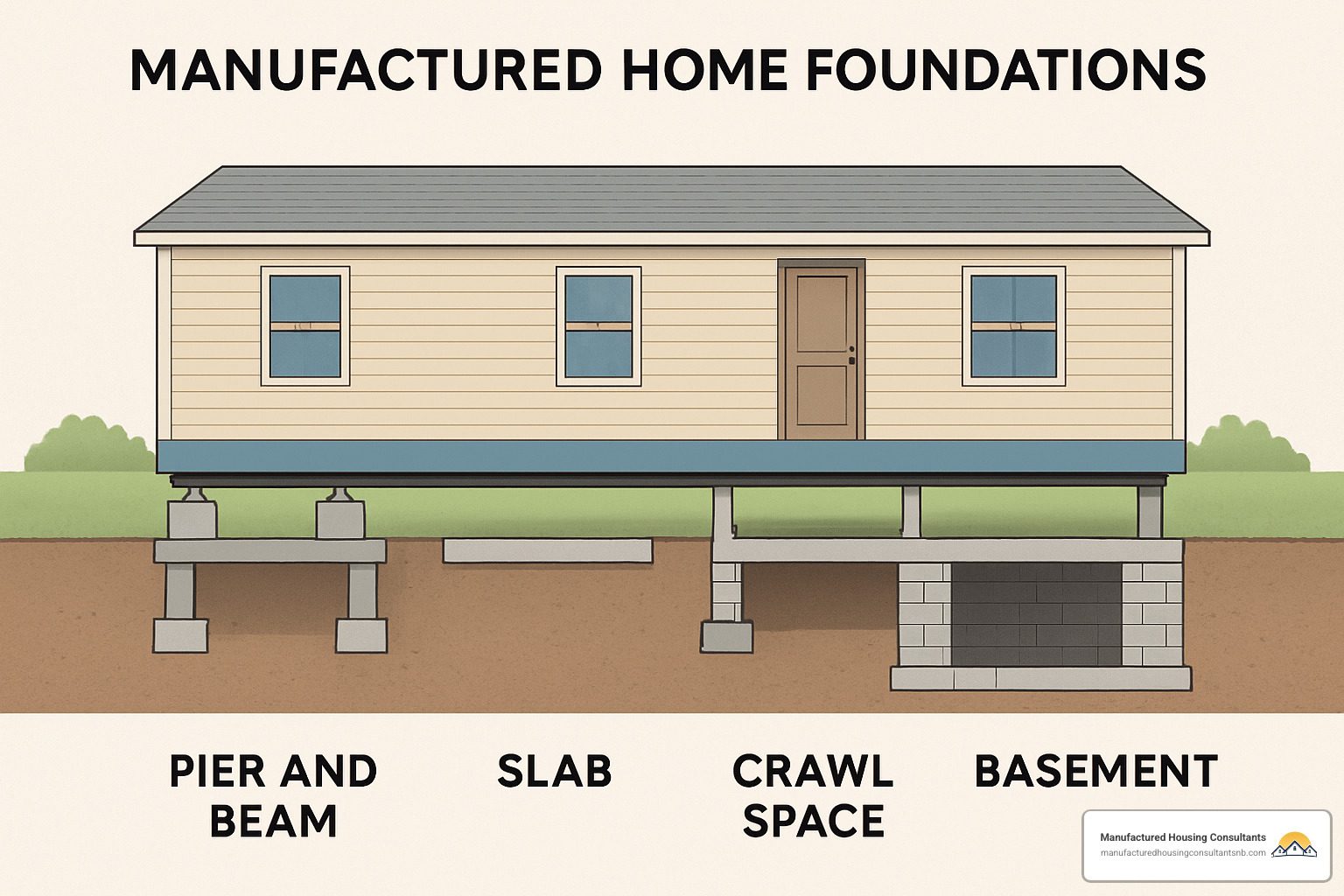Detailed Guide to Manufactured Homes Foundation Types
Learn about manufactured homes foundation types, costs, regulations, and tips to choose the best option for safety and financing.
Why Choosing the Right Foundation for Your Manufactured Home Matters
Manufactured homes foundation types determine your home’s stability, financing options, and long-term value. The foundation you choose affects everything from mortgage eligibility to storm resistance.
The 6 Main Foundation Types:
- Pier & Beam – Steel piers with ground anchors ($1,000-$2,000)
- Runner – Concrete strips under I-beams ($2,000-$6,000)
- Slab – Concrete platform foundation ($4,000-$10,000)
- Crawl Space – Perimeter walls with enclosed space ($6,000-$15,000)
- Pit-Set – Recessed crawl space design ($2,000-$6,000)
- Basement – Full underground foundation ($12,000-$25,000)
Permanent foundations (slab, crawl space, basement) qualify for FHA and VA loans, while non-permanent foundations (pier & beam, runner) offer flexibility but may limit financing options.
The right foundation depends on your soil conditions, climate, budget, and long-term plans. Pier and beam works well in flood-prone areas and seismic zones, while slab foundations excel in warm climates where frost isn’t a concern.
As one industry expert notes: “Selecting the best foundation for your mobile home requires carefully weighing the benefits and drawbacks of each choice while considering location and the permits needed for home modifications.”
Modern manufactured homes appreciate at nearly the same rate as site-built homes when placed on permanent foundations with proper installation.
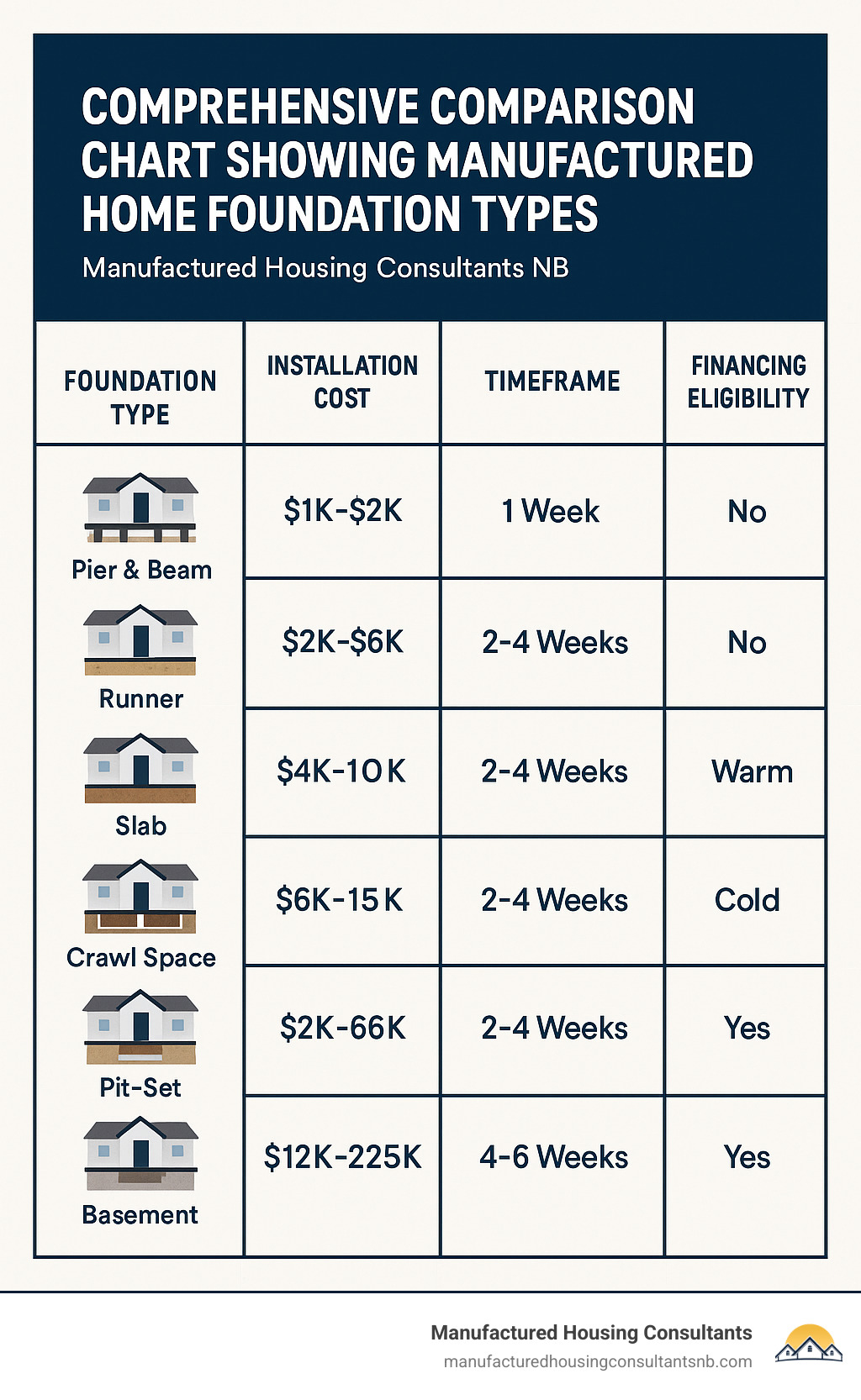
Manufactured homes foundation types vocab to learn:
Core Manufactured Homes Foundation Types Explained
Understanding manufactured homes foundation types starts with one crucial difference: permanent versus non-permanent systems. This distinction affects everything from financing to setup time.
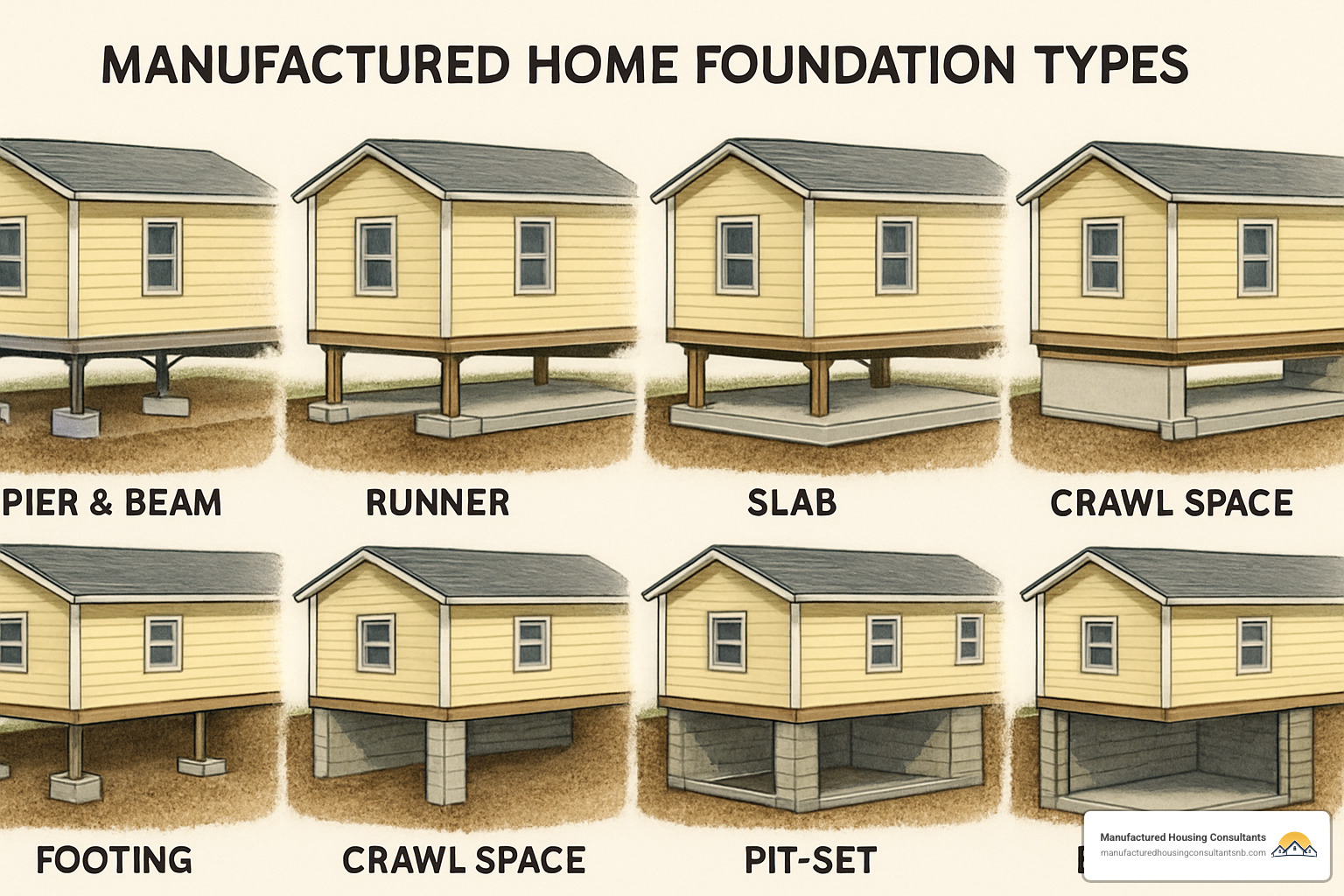
The HUD code sets foundation rules, especially for FHA or VA loan approval. Permanent foundations must use concrete, mortared masonry, or treated wood – materials built to last.
Before choosing any foundation, you’ll need soil testing. Your soil’s bearing capacity typically ranges from 1,500 to 4,500 pounds per square foot.
Your local climate plays a big role too. Wind loads, frost depth, and earthquake activity all influence which foundation works best. Basements make up 90% of foundations in northern states because of deep frost lines, while southern climates favor concrete slabs.
Permanent Foundations: Slab, Crawl Space, Basement
Permanent foundations give you the highest resale value and open doors to conventional mortgage financing. These systems meet HUD’s strict requirements for permanence.
Concrete slab foundations create a solid platform under your entire home. Picture a 4-6 inch thick concrete pad over prepared sand or gravel. Slabs work beautifully in warm climates where frost heave won’t crack the concrete. They offer excellent stability and moisture control when installed with proper perimeter insulation.
The biggest advantages include rock-solid structural stability, great moisture control, and straightforward installation. The downside? They can struggle with expansive soils or deep frost lines. Plus, accessing utilities under your home later is impossible.
Crawl space foundations feature perimeter walls creating an enclosed space beneath your home, usually about 48 inches deep. This design gives you excellent utility access while keeping all the structural benefits of a permanent foundation.
Proper ventilation is critical for crawl spaces. Building codes typically require 1 square foot of ventilation per 150 square feet of floor area. This drops to 1 per 1,500 square feet when you install a vapor barrier.
Full basement foundations offer the most potential for expanding your living space. Basements are at least 7 feet deep and can potentially double your home’s square footage. They provide excellent frost protection, storm safety, and plenty of storage.
Basement construction costs range from $12,000 to $25,000, making them the priciest foundation option. However, they often provide the best return on investment through increased living space and higher resale value.
For more detailed information about permanent foundation options, visit our More info about mobile home foundations page.
Non-Permanent Foundations: Pier & Beam, Runner, Pit-Set
Non-permanent foundations offer flexibility and lower upfront costs but may limit your financing options. These systems are designed for easier relocation and faster installation.
Pier and beam foundations are the most popular type of mobile home foundation across the United States. This system uses steel piers or concrete blocks placed at key points under your home’s frame, connected to ground anchors for stability. Installation typically costs between $1,000 and $2,000 and can often be finished in just one day.
Pier and beam systems shine in flood-prone areas where elevation protects against water damage, seismic zones where flexibility allows for ground movement, and areas with challenging soil conditions. The trade-off is potentially lower resale value and regular maintenance needs.
Runner foundations consist of concrete strips or pads placed under each I-beam of your home. These foundations measure about 2 feet wide and 6 inches deep, providing support only where needed. Runner foundations work best on flat, well-drained lots and offer excellent utility access.
The main benefits include lower material costs since you’re only using concrete where needed, easier utility access, and good performance in dry climates. However, they’re not recommended for areas with earthquake activity or expansive soils. Installation costs typically range from $2,000 to $8,000.
Pit-set crawl spaces blend elements of permanent and non-permanent foundations. Your home gets set into an excavated area about 2 feet below and 2 feet above ground level, creating a shallow basement effect.
Pit-set foundations work particularly well on sloping lots where they create a level installation surface. They provide protection from wind and weather while offering some under-home storage space. Costs typically range from $2,000 to $6,000.
For comprehensive guidance on foundation requirements and HUD compliance, consult the Permanent Foundations Guide for Manufactured Housing.
Choosing, Installing & Maintaining Your Foundation
Selecting the right foundation requires careful consideration of multiple factors, from site conditions to long-term goals. Professional installation and ongoing maintenance ensure optimal performance.
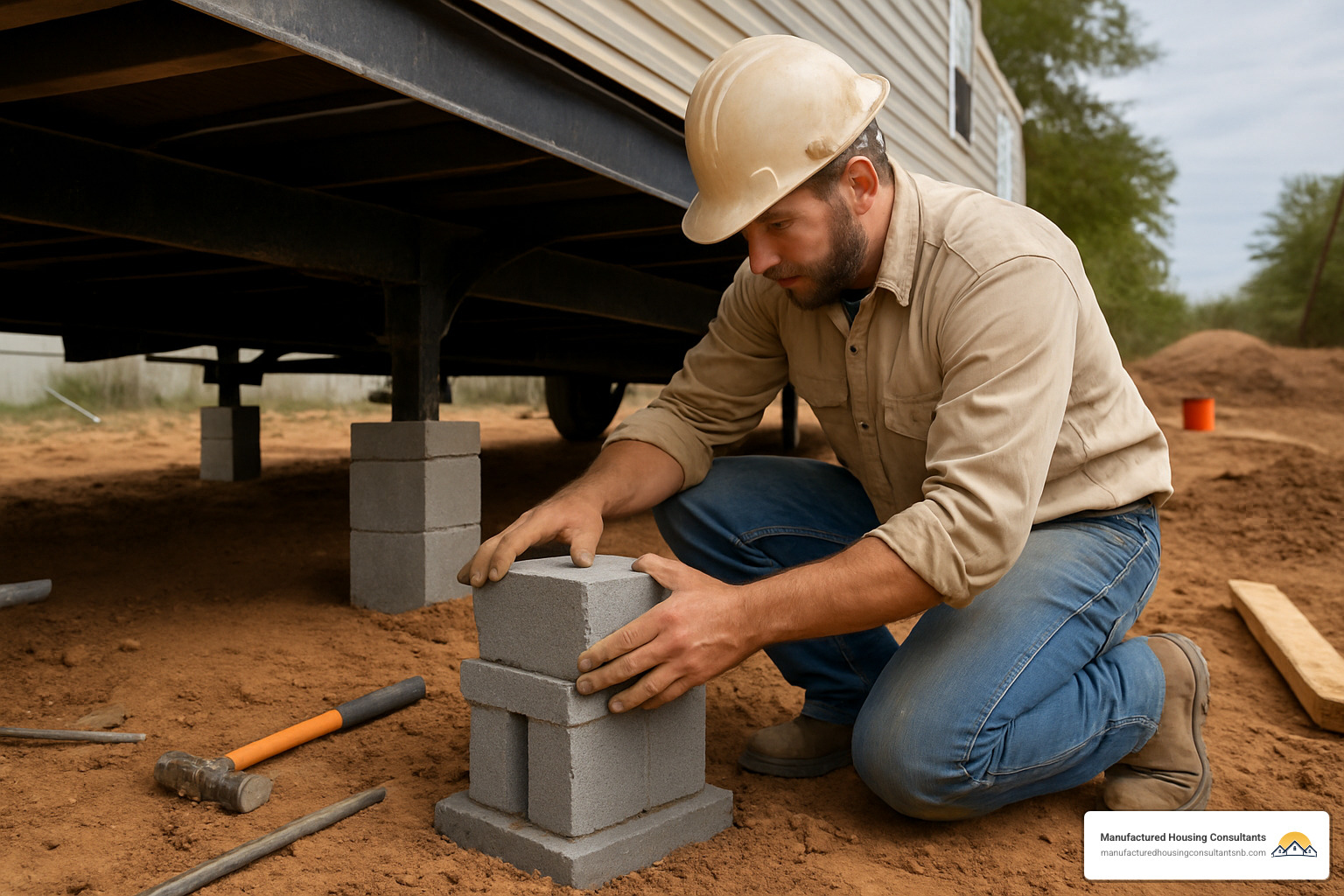
How to Choose the Best Manufactured Homes Foundation Types
Site conditions are the primary factor in foundation selection. Begin with a professional soil test to determine bearing capacity and identify challenging conditions like expansive clay or high water tables.
Slope and drainage significantly impact foundation choice. Flat lots work well with slab or runner foundations, while sloping sites may require crawl space or basement foundations. Always ensure proper drainage away from the foundation.
Climate considerations include frost depth, wind loads, and seismic activity. In areas with frost depths below 36 inches, basement foundations often provide the most cost-effective solution. Coastal areas with high wind loads may require additional anchoring. Seismic zones often favor pier and beam systems for their flexibility.
Flood zones require special attention to elevation requirements. FEMA mandates that manufactured home floors be set above the 100-year base flood elevation in designated floodplains. Pier and beam foundations excel in these conditions.
Financing requirements heavily influence foundation choice. FHA and VA loans require permanent foundations meeting specific HUD criteria. If you plan to use government-backed financing, you’ll need to choose from slab, crawl space, or basement options with proper engineering certification.
For detailed information about foundation selection criteria, visit our More info about Mobile Home Foundation Types page.
Installation Timeline & Cost Comparison of Manufactured Homes Foundation Types
Understanding installation timelines and costs helps you plan your project budget and schedule effectively.
Pier & Beam Installation is the fastest option, often completed in one working day. The process involves setting piers at specified locations, installing ground anchors, and connecting tie-down straps.
Runner Foundation Installation typically takes 2-3 days, including site preparation and concrete curing time.
Slab Foundation Installation requires 5-7 days from excavation to final cure. The process includes site preparation, utility rough-in, forming, pouring, and curing.
Crawl Space Foundation Installation takes 7-10 days and involves the most complex construction process. Excavation, footing placement, wall construction, and waterproofing all require time and skilled labor.
Basement Foundation Installation is the most time-intensive option, requiring 10-14 days for completion. Deep excavation, extensive concrete work, waterproofing, and backfilling all contribute to extended timelines.
| Foundation Type | Cost Range | Installation Time | Climate Suitability | Financing Eligible |
|---|---|---|---|---|
| Pier & Beam | $1,000-$2,000 | 1 day | All climates | Non-permanent |
| Runner | $2,000-$6,000 | 2-3 days | Dry, flat areas | Non-permanent |
| Slab | $4,000-$10,000 | 5-7 days | Warm climates | Permanent |
| Crawl Space | $6,000-$15,000 | 7-10 days | Most climates | Permanent |
| Pit-Set | $2,000-$6,000 | 3-5 days | Sloped lots | Semi-permanent |
| Basement | $12,000-$25,000 | 10-14 days | Cold climates | Permanent |
We strongly recommend professional installation for all foundation types. Proper installation is critical for structural integrity, code compliance, and warranty coverage.
Regulations, Financing & Long-Term Care
HUD and FHA Requirements establish specific criteria for manufactured home foundations. For FHA loan eligibility, foundations must include masonry piers, removal of wheels and axles, concrete footings at least 8 inches by 2 feet by 2 feet, stabilizer structures, earth anchors and straps, and a 6-mil vapor barrier in crawl spaces.
The foundation must also provide at least 18 inches of clearance from finished grade to floor joists and ensure the home meets the 400 square foot minimum living area requirement.
Local Building Permits are required for most foundation installations. Permit requirements vary by jurisdiction, but typically include site plans, foundation drawings, soil reports, and inspection schedules.
State-specific regulations add another layer of requirements. For example, California often requires frost-protected shallow foundations. Oregon mandates composite piers that combine footing, pier, and shimming elements.
Skirting requirements apply to most foundation types and serve both aesthetic and functional purposes. Skirting protects under-home components from weather and pests while improving curb appeal. Costs vary from $500 to $3,000 depending on materials and home size.
Annual maintenance includes leveling checks, particularly important for non-permanent foundations. We recommend checking level every other year for permanent foundations and annually for non-permanent systems.
Insurance considerations may vary based on foundation type. Permanent foundations often qualify for better homeowners insurance rates, while non-permanent foundations may require specialized mobile home insurance.
For professional assistance with foundation installation and financing, visit Find Local Pros.
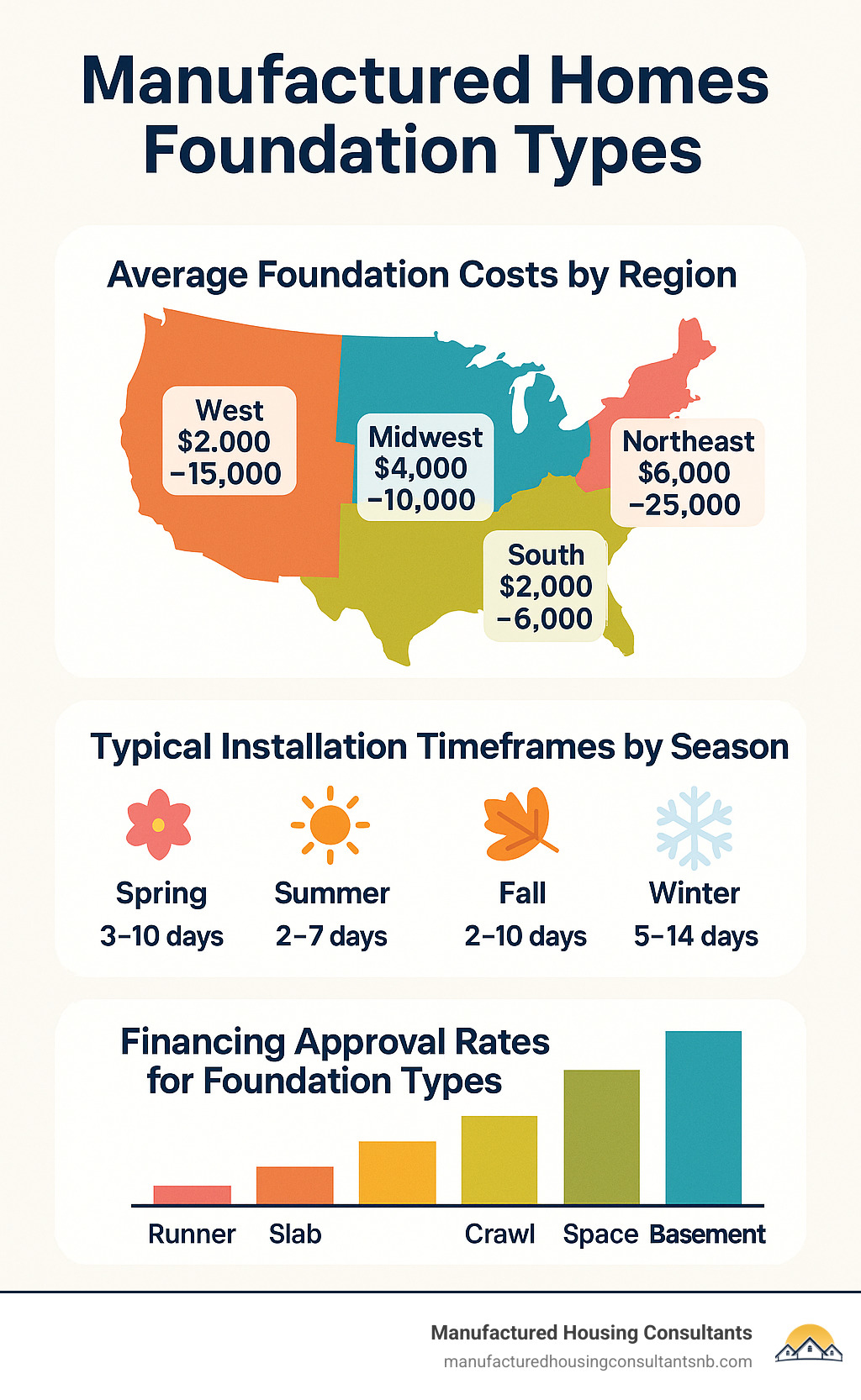
Conclusion & Next Steps
Choosing the right manufactured homes foundation types is one of the most important decisions you’ll make as a manufactured home buyer. The foundation affects your home’s stability, financing options, resale value, and long-term maintenance requirements.
At Manufactured Housing Consultants, we understand that foundation selection can feel overwhelming. That’s why we’re committed to helping our customers make informed decisions based on their specific needs, site conditions, and budget constraints.
Our services include:
- Foundation consultation and site evaluation
- Coordination with licensed engineers and contractors
- Land improvement services to prepare your site
- Comprehensive financing options for all foundation types
- One-stop service from home selection through final installation
We’re proud to offer guaranteed lowest prices on manufactured homes from 11 top manufacturers, ensuring you get the best value for your investment.
Remember these key points:
- Permanent foundations (slab, crawl space, basement) qualify for FHA/VA loans and typically offer better resale value
- Non-permanent foundations (pier & beam, runner) provide flexibility and lower initial costs
- Site conditions, climate, and local codes significantly influence the best foundation choice
- Professional installation and ongoing maintenance are essential for optimal performance
Next steps:
- Schedule a site evaluation to assess soil conditions and local requirements
- Determine your financing preferences and loan eligibility
- Review local building codes and permit requirements
- Compare foundation costs and installation timelines
- Select qualified contractors and obtain necessary certifications
Ready to explore your manufactured home and foundation options? Our experienced team in New Braunfels, Texas, is here to help you steer every aspect of the process. From initial consultation through final installation, we’re committed to making your manufactured home ownership dreams a reality.
For comprehensive information about financing options for your manufactured home and foundation, visit our Introduction to Mobile Home Financing page.
Contact Manufactured Housing Consultants today to discuss your specific needs and find how we can help you find the perfect manufactured home with the ideal foundation for your situation.

